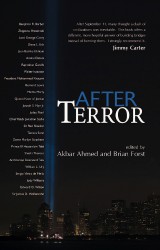Details

After Terror
Promoting Dialogue Among Civilizations1. Aufl.
|
18,99 € |
|
| Verlag: | Wiley |
| Format: | |
| Veröffentl.: | 16.04.2013 |
| ISBN/EAN: | 9780745674834 |
| Sprache: | englisch |
| Anzahl Seiten: | 224 |
DRM-geschütztes eBook, Sie benötigen z.B. Adobe Digital Editions und eine Adobe ID zum Lesen.
Beschreibungen
After Terror presents sustained reflections by some of the world's most celebrated thinkers on the most pressing question of our time: how can we find ways to defuse the ticking bombs of terrorism and excessive interventions against it? It offers an antidote to the fatalistic global holy war perspective that afflicts much contemporary thought, focusing instead on the principles, issues, and acts needed to shift course from alienation and conflict to a path of sanity and goodwill among cultures and civilizations. <p>The central aim of the book is to advance contemporary thinking on the causes and implications of 9/11 and thus provide the essential elements of a blueprint for humanity. It features 28 original essays by some of the world's leading public figures, scholars, and religious leaders, including Benjamin Barber, Zbigniew Brzezinski, Jean Bethke Elshtain, Amitai Etzioni, Bernard Lewis, Martin Marty, Queen Noor, Joseph Nye, Judea Pearl, Jonathan Sacks, Ravi Shankar, Bishop Desmond Tutu, E.O. Wilson and James D. Wolfensohn.</p> <p>After Terror attests to the power of dialogue and mutual understanding and the possibility of tolerance, respect, cooperation, and commitment. Without ignoring the dangers of the modern world, it points to a future in which people can celebrate both the fundamental sentiments and interests that we share and the diversities that make us human.</p>
<p>Acknowledgments x</p> <p>Contributor Biographies in Brief xii</p> <p><b>Part I Introduction 1</b></p> <p>1 Toward a More Civil Twenty-first Century<br /><i>Akbar Ahmed and Brian Forst</i> 3</p> <p><b>Part II The Nature and Sources of the Problem 13</b></p> <p>2 The Simple Power of Weakness, the Complex Vulnerability of Power<br /><i>Zbigniew Brzezinski</i> 15</p> <p>3 Dialogue and the Echo Boom of Terror: Religious Women's Voices after 9/11<br /><i>Diana L. Eck</i> 21</p> <p>4 Closing Chapters of Enmity<br /><i>Rajmohan Gandhi</i> 29</p> <p>5 Benjamin Franklin's Gift of Tolerance<br /><i>Walter Isaacson</i> 36</p> <p>6 God's Word and World Politics<br /><i>Archbishop Desmond Tutu</i> 39</p> <p><b>Part III Pathways to Dialogue and Understanding 45</b></p> <p>7 The Role of the Media in Promoting Tolerance<br /><i>Shashi Tharoor</i> 47</p> <p>8 Civilization, Human Rights, and Collective Responsibility<br /><i>Sergio Vieira de Mello</i> 55</p> <p>9 Endless Enemies or Human Security<br /><i>Jody Williams</i> 66</p> <p>10 Dialogue among Civilizations and Cultures<br /><i>President Seyed Mohammed Khatami</i> 72</p> <p>11 Transnational Moral Dialogues<br /><i>Amitai Etzioni</i> 79</p> <p>12 In Other People's Shoes<br /><i>Dame Marilyn Strathern</i> 85</p> <p>13 A Universal Language, without Boundary or Prejudice<br /><i>Sir Ravi Shankar</i> 90</p> <p>14 Dialogue among Civilizations<br /><i>Kofi Annan</i> 94</p> <p>15 The Productive Airing of Grievances<br /><i>Lord George Carey</i> 98</p> <p>16 All of Man's Troubles<br /><i>Edward O. Wilson</i> 106</p> <p>17 Turning Enemies into Friends<br /><i>Chief Rabbi Jonathan Sacks</i> 112</p> <p>18 Security through Dialogue<br /><i>Queen Noor of Jordan</i> 119</p> <p>19 The Power of Dialogue: Redefining "Us"<br /><i>Tamara Sonn</i> 131</p> <p>20 On Clash, Morality, Renaissance, and Dialogue<br /><i>Judea Pearl</i> 138</p> <p>21 The Just War Tradition and Cultural Dialogue<br /><i>Jean Bethke Elshtain</i> 145</p> <p>22 Celebrating Differences on our Melting Pot Planet<br /><i>Prince El Hassan bin Talal</i> 149</p> <p><b>Part IV From Concern to Action 155</b></p> <p>23 Clash or Dialogue of Cultures?<br /><i>Bernard Lewis</i> 157</p> <p>24 The Fellowship of Dialogue<br /><i>James D. Wolfensohn</i> 159</p> <p>25 Hard Power and Soft Power<br /><i>Joseph S. Nye Jr</i> 166</p> <p>26 Global Governance in an Interdependent World<br /><i>Benjamin R. Barber</i> 171</p> <p>27 Getting to Peace: Awakening the Third Side<br /><i>William L. Ury</i> 179</p> <p>28 Risking Hospitality<br /><i>Martin Marty</i> 186</p> <p>Index 191</p>
“If you are looking for reading that is thought-provoking, incisive, and challenging, <i>After Terror</i> is the perfect book to read.”<br /> <b><i>Friday Times<br /> </i></b> <br /> “It is good to have a work which includes within its covers the reflections of [the] President of the World Bank, an international activist who founded the International Campaign to Ban Landmines and who was awarded the Nobel Peace Prize in 1997 for her extraordinary activities in clearing anti-personnel mines from battle zones, and one of the most respected of contemporary musicians. This ensures that there is something for everyone in this compilation!”<br /> <b><i>Muslim World Book Review</i></b>
<b>Akbar Ahmed</b> and <b>Brian Forst</b>, both of the American University, Washington.
After Terror presents sustained reflections by some of the world's most celebrated thinkers on the most pressing question of our time: how can we find ways to defuse the ticking bombs of terrorism and excessive interventions against it? It offers an antidote to the fatalistic global holy war perspective that afflicts much contemporary thought, focusing instead on the principles, issues, and acts needed to shift course from alienation and conflict to a path of sanity and goodwill among cultures and civilizations. <p>The central aim of the book is to advance contemporary thinking on the causes and implications of 9/11 and thus provide the essential elements of a blueprint for humanity. It features 28 original essays by some of the world's leading public figures, scholars, and religious leaders, including Benjamin Barber, Zbigniew Brzezinski, Jean Bethke Elshtain, Amitai Etzioni, Bernard Lewis, Martin Marty, Queen Noor, Joseph Nye, Judea Pearl, Jonathan Sacks, Ravi Shankar, Bishop Desmond Tutu, E.O. Wilson and James D. Wolfensohn.</p> <p>After Terror attests to the power of dialogue and mutual understanding and the possibility of tolerance, respect, cooperation, and commitment. Without ignoring the dangers of the modern world, it points to a future in which people can celebrate both the fundamental sentiments and interests that we share and the diversities that make us human.</p>


















